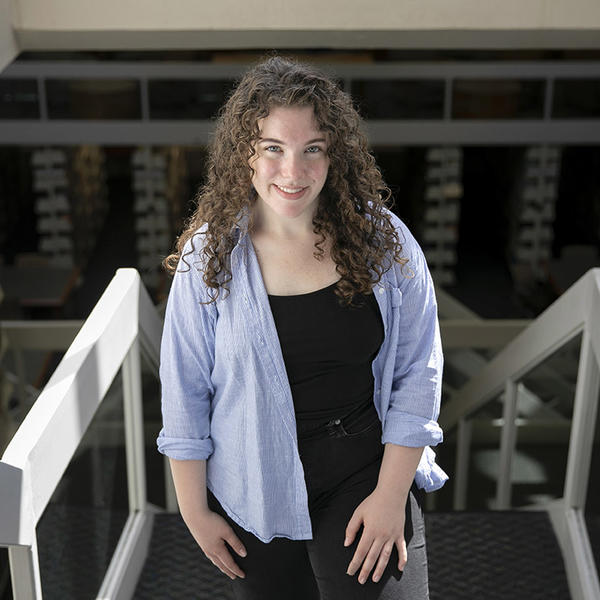Catherine Yackira '24 completed her sophomore year at the College of the Holy Cross and planned to use this summer to research U.S. Supreme Court decisions from more than a century ago. The cases, ranging from 1897 to 1937, focus on rights founded through substantive due process, a key legal ingredient in American life, but one that primarily exists in ambiguity to the public.
In June, though, the Supreme Court indirectly spotlighted the idea of substantive due process for millions of Americans in its ruling on the case of Dobbs v. Jackson. Atop Mount St. James, the court's decision to overturn Roe v. Wade in some ways transformed Yackira's Charles Weiss Summer Research.
"It was such a landmark moment that felt almost unreal," Yackira said.
Her passion for constitutional law was born from her time on the College's moot law and mock trial teams, so much so she decided to immerse herself in constitutional law research this summer.
The Las Vegas native is examining the due process clause, which derives from the Fifth and 14th Amendments. The pair dictates that no person shall be deprived of life, liberty or property without due process of law.
While many connect due process with criminal trials, the Supreme Court also established the idea of substantive due process, which are certain innumerable rights that fall under the word “liberty” in those two amendments.
"It's that the government has to have a really, really good reason to make a law that infringes on that type of liberty," Yackira said. "So, the question is: What rights fall under that word 'liberty'?"
To examine that, Yackira targeted cases at the turn of the 20th century, specifically Lochner v. New York, in which the Supreme Court ruled in 1905 that a New York state law setting maximum working hours for bakers violated a worker's right to freedom of contract under the 14th Amendment.
At the time, the decision sparked an uproar from progressives, who labeled the court as evil in its ruling, which they believed hurt the working class. The barbs behind those arguments have dulled over the more than 100 years since the decision, which offered Yackira a substantial buffer to make independent conclusions.
The Dobbs decision provided almost no time for Yackira to analyze it as part of her summer research, but it carried just as much historical value. Her advisor, Alex Hindman, assistant professor of political science, suggested the two postpone their weekly Friday discussions due to the gravity of the ruling.
"Friday was a shock to a lot of people in a lot of ways," Hindman said. "Then Catherine said, 'I'm going to take the weekend and grind this opinion out.' I think too often people don't do the reading of what's actually underneath it. To her credit, she went into it. She went into the mines, so to speak, to figure out what was actually there."
Analyzing Lochner provided a blueprint to examine the history handed down this year. Mount St. James, a quiet campus in the summer, offered a rare perspective on current events.
"I feel like at Holy Cross I've had a unique opportunity to learn the law before I even apply to law school," Yackira said. "I'm coming to my own conclusions in a way that I don't in a class. In a class, someone is teaching you the material and then you discuss it with other people. So that can definitely sway your opinion. This is just purely reading, I think about it. I digest it and then I read something else that may change my mind, then I talk to Professor Hindman."
The conversations with Hindman only provoked more thoughts, as Yackira's advisor played Devil's Advocate.
"I think that's the courage that's nice about Holy Cross," Hindman said. "One of the things Holy Cross encourages our students to do is — we're going to be with you when you do it, but — go into the fray. Go in and see what this is about. See what the controversy is. We're not afraid to look in certain places. We do it in a way that is serious, rigorous and fair. And hopefully fair to both positions in something that's this important. But look into the hole. Find the spot that you need to see."
Yackira will present what she found during a seminar in the fall. It's likely she'll also use her research as a foundation for a year-long thesis at some point. There's plenty to uncover, however, as Yackira's summer involved several detours through about 120 years of Supreme Court decisions, including one that scholars will continue to study centuries from now.
"After you've done thousands of pages of reading and it starts to make sense, then it becomes fun," Yackira said. "So I still really enjoy that. I still want to go to law school. The research made me love the law and constitutional law even more."
Student Summer Research Project Connects Current Supreme Court Decision to Those 100+ Years Old

Catherine Yackira’s ’24 passion for constitutional law grew after diving into early 20th-century cases.
Read Time
4 Minutes